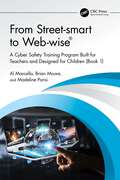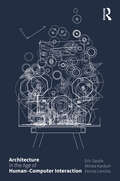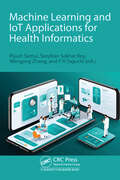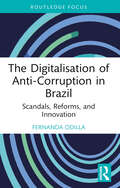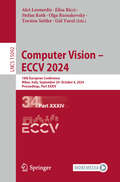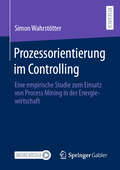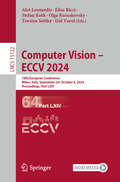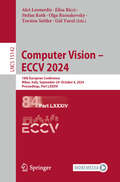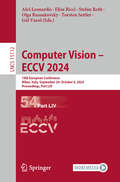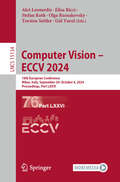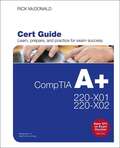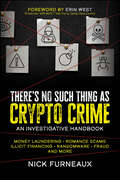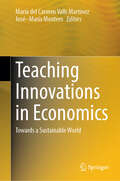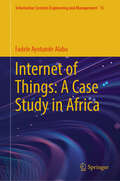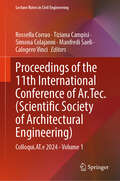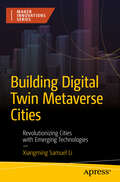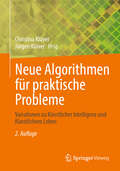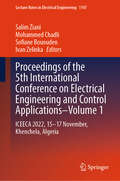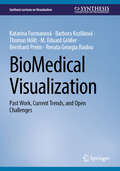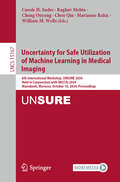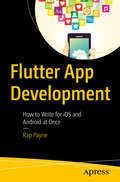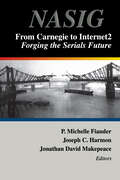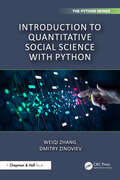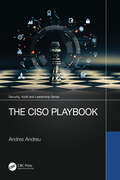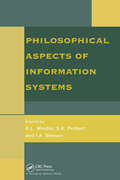- Table View
- List View
From Street-smart to Web-wise®: A Cyber Safety Training Program Built for Teachers and Designed for Children (Book 1)
by Brian Moore Al Marcella Madeline ParisiIn a world where tiny fingers are as familiar with touchscreens as they are with crayons, ensuring our children’s safety online has never been more crucial. From Street‑smart to Web‑wise®: A Cyber Safety Training Program Built for Teachers and Designed for Children isn’t just another book – it’s a passionate call to action for teachers and a roadmap to navigate the digital landscape safely, with confidence and care.Written by authors who are recognized experts in their respective fields, this accessible manual is a timely resource for educators. Dive into engaging content that illuminates the importance of cyber safety, not only in our classrooms but extending into the global community.Each chapter is filled with practical examples, stimulating discussion points, and ready‑to‑use lesson plans tailored for students in kindergarten through second grade. Regardless of your technology skill level, this book will provide you with the guidance and the tools you need to make student cyber‑safety awareness practical, fun, and impactful.As parents partner with educators to create cyber‑secure spaces, this book stands as a framework of commitment to that partnership. It’s a testament to taking proactive steps in equipping our young learners with the awareness and skills they need to tread the digital world securely.By choosing From Street‑smart to Web‑wise®: A Cyber Safety Training Program Built for Teachers and Designed for Children, you position yourself at the forefront of educational guardianship, championing a future where our children can explore, learn, and grow online without fear. Join us on this journey to empower the next generation—one click at a time!
Architecture in the Age of Human–Computer Interaction
by Eric Sauda Alireza Karduni Donna LanclosThis book investigates the spaces where architecture and computer science share a common set of assumptions and goals, using methods and objectives from architecture, ethnography, and human–computer interaction (HCI).Architecture and HCI depend on and borrow from each other, and even share some vocabulary in their divergent disciplinary agendas. The authors here unpack the past, present, and potential futures of architecture and the user interface, employing the lens of ethnography and ethnographic practices to launch this exciting cross-disciplinary inquiry. The goal is the creation of an interface that is able to connect the wide range of embodied architectural space, the modes of interaction afforded by computation, and the social process of creating meaningful places.This will be of great interest to upper-level students and academics in the fields of architecture, human–computer interaction, and ethnography.
Machine Learning and IoT Applications for Health Informatics
by Pijush Samui Zhang Wengang Sekhar Roy Sanjiban Taguchi Y HThis book brings together leading experts from around the world to explore the transformative potential of Machine Learning (ML) and the Internet of Things (IoT) in healthcare. It provides a platform for studying a future where healthcare becomes more precise, personalized, and accessible for all. The book covers recent advancements that will shape the future of healthcare and how artificial intelligence is revolutionizing disease detection, from analyzing chest X-rays for pneumonia to solving the secrets of our genes. It investigates the transformative potential of smart devices, real-time analysis of heart data, and personalized treatment plan creation. It shows how ML and IoT work and presents real-world examples of how they are leading to earlier and more accurate diagnoses and personalized treatments.Therefore, this edited book will be an invaluable resource for researchers, healthcare professionals, data scientists, or simply someone passionate about the future of healthcare. Readers will discover the exciting possibilities that lie ahead at the crossroads of ML, IoT, and health informatics.
The Digitalisation of Anti-Corruption in Brazil: Scandals, Reforms, and Innovation (ISSN)
by Fernanda OdillaThis book investigates how digital technologies, such as social media and artificial intelligence, can contribute to combatting corruption in Brazil.Brazil, with its long history of scandals and abundant empirical data on digital media usage, serves as a perfect case study to trace the development of bottom-up and top-down digital anti-corruption technologies and their main features. This book highlights the connections between anti-corruption reforms and the rapid implementation of innovative solutions, primarily developed by tech-savvy public officials and citizens committed to anti-corruption efforts. The book draws on interviews with experts, activists and civil servants, as well as open-source materials and social media data to identify key actors, their practices, challenges and limitations of anti-corruption technologies. The result is a thorough analysis of the process of digitalisation of anti-corruption in Brazil, with a theoretical framework which can also be applied to other countries. The book introduces the concept of “integrity techies” to encompass social and political actors who develop and facilitate anti-corruption technologies, and discusses different outcomes and issues associated with digital innovation in anti-corruption.This book will be a key resource for students, researchers and practitioners interested in technologies and development in Brazil and Latin America, as well as corruption and anti-corruption studies more broadly.
Computer Vision – ECCV 2024: 18th European Conference, Milan, Italy, September 29–October 4, 2024, Proceedings, Part XXXIV (Lecture Notes in Computer Science #15092)
by Stefan Roth Aleš Leonardis Elisa Ricci Torsten Sattler Olga Russakovsky Gül VarolThe multi-volume set of LNCS books with volume numbers 15059 up to 15147 constitutes the refereed proceedings of the 18th European Conference on Computer Vision, ECCV 2024, held in Milan, Italy, during September 29–October 4, 2024. The 2387 papers presented in these proceedings were carefully reviewed and selected from a total of 8585 submissions. They deal with topics such as computer vision; machine learning; deep neural networks; reinforcement learning; object recognition; image classification; image processing; object detection; semantic segmentation; human pose estimation; 3d reconstruction; stereo vision; computational photography; neural networks; image coding; image reconstruction; object recognition; motion estimation.
Prozessorientierung im Controlling: Eine empirische Studie zum Einsatz von Process Mining in der Energiewirtschaft
by Simon WahrstötterDie zunehmende Prozessorientierung in Unternehmen geht mit signifikanten Veränderungen im Controlling einher. Um das Prozessmanagement zu unterstützen und die Anforderungen an ein effektives Process Performance Measurement zu erfüllen, wird Process Mining als innovative Technologie eingesetzt. Auf Basis von 33 Experteninterviews identifiziert die vorliegende empirische Studie Potentiale und Herausforderungen für Unternehmen und Controlling‐Bereiche, die aus der Prozessorientierung und dem Einsatz von Process Mining resultieren. Darauf aufbauend wird ein fünfstufiges Reifegradmodell entwickelt, das konkrete und evidenzbasierte Lösungsvorschläge und Handlungsempfehlungen für die optimale Ausgestaltung eines Process Mining-gestützten Prozesscontrollings bereithält.
Computer Vision – ECCV 2024: 18th European Conference, Milan, Italy, September 29–October 4, 2024, Proceedings, Part LXIV (Lecture Notes in Computer Science #15122)
by Stefan Roth Aleš Leonardis Elisa Ricci Torsten Sattler Olga Russakovsky Gül VarolThe multi-volume set of LNCS books with volume numbers 15059 up to 15147 constitutes the refereed proceedings of the 18th European Conference on Computer Vision, ECCV 2024, held in Milan, Italy, during September 29–October 4, 2024. The 2387 papers presented in these proceedings were carefully reviewed and selected from a total of 8585 submissions. They deal with topics such as computer vision; machine learning; deep neural networks; reinforcement learning; object recognition; image classification; image processing; object detection; semantic segmentation; human pose estimation; 3d reconstruction; stereo vision; computational photography; neural networks; image coding; image reconstruction; motion estimation.
Computer Vision – ECCV 2024: 18th European Conference, Milan, Italy, September 29 – October 4, 2024, Proceedings, Part LXXXIV (Lecture Notes in Computer Science #15142)
by Stefan Roth Aleš Leonardis Elisa Ricci Torsten Sattler Olga Russakovsky Gül VarolThe multi-volume set of LNCS books with volume numbers 15059 upto 15147 constitutes the refereed proceedings of the 18th European Conference on Computer Vision, ECCV 2024, held in Milan, Italy, during September 29–October 4, 2024. The 2387 papers presented in these proceedings were carefully reviewed and selected from a total of 8585 submissions. They deal with topics such as Computer vision, Machine learning, Deep neural networks, Reinforcement learning, Object recognition, Image classification, Image processing, Object detection, Semantic segmentation, Human pose estimation, 3D reconstruction, Stereo vision, Computational photography, Neural networks, Image coding, Image reconstruction and Motion estimation.
Computer Vision – ECCV 2024: 18th European Conference, Milan, Italy, September 29–October 4, 2024, Proceedings, Part LIV (Lecture Notes in Computer Science #15112)
by Stefan Roth Aleš Leonardis Elisa Ricci Torsten Sattler Olga Russakovsky Gül VarolThe multi-volume set of LNCS books with volume numbers 15059 upto 15147 constitutes the refereed proceedings of the 18th European Conference on Computer Vision, ECCV 2024, held in Milan, Italy, during September 29–October 4, 2024. The 2387 papers presented in these proceedings were carefully reviewed and selected from a total of 8585 submissions. They deal with topics such as Computer vision, Machine learning, Deep neural networks, Reinforcement learning, Object recognition, Image classification, Image processing, Object detection, Semantic segmentation, Human pose estimation, 3D reconstruction, Stereo vision, Computational photography, Neural networks, Image coding, Image reconstruction and Motion estimation.
Computer Vision – ECCV 2024: 18th European Conference, Milan, Italy, September 29–October 4, 2024, Proceedings, Part LXXVI (Lecture Notes in Computer Science #15134)
by Stefan Roth Aleš Leonardis Elisa Ricci Torsten Sattler Olga Russakovsky Gül VarolThe multi-volume set of LNCS books with volume numbers 15059 up to 15147 constitutes the refereed proceedings of the 18th European Conference on Computer Vision, ECCV 2024, held in Milan, Italy, during September 29–October 4, 2024. The 2387 papers presented in these proceedings were carefully reviewed and selected from a total of 8585 submissions. They deal with topics such as computer vision; machine learning; deep neural networks; reinforcement learning; object recognition; image classification; image processing; object detection; semantic segmentation; human pose estimation; 3d reconstruction; stereo vision; computational photography; neural networks; image coding; image reconstruction; motion estimation.
CompTIA A+ Core 1 (220-1001) and Core 2 (220-1002) Cert Guide (Certification Guide)
by Rick McDonald Richard McDonaldCompTIA A+ Cert Guide Core 1 (220-1001) and Core 2 (220-1002), 5th Edition is a best-of-breed exam study guide. Leading IT certification instructor Rick McDonald shares preparation hints and test-taking tips, helping you identify areas of weakness and improve both your conceptual knowledge and hands-on skills. Material is presented in a concise manner, focusing on increasing your understanding and retention of exam topics.
There's No Such Thing as Crypto Crime: An Investigative Handbook
by Nick FurneauxHands-on guidance for professionals investigating crimes that include cryptocurrency In There’s No Such Thing as Crypto Crime: An Investigators Guide, accomplished cybersecurity and forensics consultant Nick Furneaux delivers an expert discussion of the key methods used by cryptocurrency investigators, including investigations on Bitcoin and Ethereum type blockchains. The book explores the criminal opportunities available to malicious actors in the crypto universe, as well as the investigative principles common to this realm. The author explains in detail a variety of essential topics, including how cryptocurrency is used in crime, exploiting wallets, and investigative methodologies for the primary chains, as well as digging into important areas such as tracing through contracts, coin-swaps, layer 2 chains and bridges. He also provides engaging and informative presentations of: Strategies used by investigators around the world to seize the fruits of crypto-related crime How non-fungible tokens, new alt-currency tokens, and decentralized finance factor into cryptocurrency crime The application of common investigative principles—like discovery—to the world of cryptocurrency An essential and effective playbook for combating crypto-related financial crime, There’s No Such Thing as Crypto Crime will earn a place in the libraries of financial investigators, fraud and forensics professionals, and cybercrime specialists.
Teaching Innovations in Economics: Towards a Sustainable World
by José–María Montero María del Carmen Valls MartínezThis book highlights the latest technological innovations in economics education. Economics, as a discipline, not only studies the relationship between ends and scarce means, which can be used alternatively, but also serves as a social science that uses historical data to predict future events—a task complicated by the influence of human behavior. In economics, a solid theoretical foundation alone is insufficient; practical application requires a deep understanding of statistics. With the vast amount of information available today, data processing is now performed using specialized software. Consequently, teaching economics demands a wide range of complex skills that have significantly evolved in recent years, driven by the growing interest in educational innovation among professors and scientists, further accelerated by advancements in new technologies. Moreover, economics education is increasingly aligned with the global concern for sustainability, as emphasized in the United Nations' Agenda 2030. Professors are now integrating sustainability into syllabi and teaching methodologies. This book covers key topics such as: Technological and innovative advancements in economics education. New teaching-learning theories and models in economics education. The impact of digital transformation on economics education. The role of artificial intelligence in economics education. Addressing special educational needs in economics education. Evaluation of the teaching-learning process in economics. Assessment of student learning in economics. Development of materials and tools for economics education. Final projects (Undergraduate and Master's) in economics. Authored by leading professors and researchers in the field, this book presents a collection of chapters that rigorously explore teaching innovations in economics.
Internet of Things: A Case Study in Africa (Information Systems Engineering and Management #13)
by Fadele Ayotunde AlabaExplore the transformative potential of the Internet of Things (IoT) within the unique context of Africa. This comprehensive work delves into the challenges, opportunities, and future trends of IoT, with a particular focus on Nigeria. Readers will discover a novel security framework and defense mechanisms tailored to address the specific needs and vulnerabilities of IoT systems in the African setting. Unlike traditional texts, this book provides a detailed case study approach, illustrating real-world applications and implications of IoT in Africa. It covers a wide range of topics, including the integration of IoT in agriculture, healthcare, and urban development, and highlights both technological advancements and socio-economic impacts. Intended for researchers, practitioners, policymakers, and students, this book offers valuable insights and practical solutions. It serves as an essential resource for anyone looking to understand the dynamic landscape of IoT in Africa and leverage its potential for sustainable development. Key uses of this book include guiding the implementation of IoT projects in developing regions, informing policy formulation, and fostering innovation in IoT security. By addressing the unique challenges faced in Africa, this work stands out as a pivotal reference for advancing IoT technology in similar environments globally.
Proceedings of the 11th International Conference of Ar.Tec.: Colloqui.AT.e 2024 - Volume 1 (Lecture Notes in Civil Engineering #610)
by Rossella Corrao Tiziana Campisi Simona Colajanni Manfredi Saeli Calogero VinciThis book gathers the proceedings of the 11th International Conference of Ar.Tec. (Scientific Society of Architectural Engineering), Colloqui.AT.e, which was held in Palermo, Italy, on June 12–15, 2024, and brought together scholars in the fields of construction and conservation history, building construction and performance, building design and technologies. Digital transition and design of 4.0 buildings, digital twins for the management of historical building heritage, building-human-environment relationships, and mitigation of vulnerabilities for the preservation of the built environment are also explored. The contributions demonstrate that architectural engineering enables the construction of sustainable, resilient, adaptive, and high-performance buildings, and as such is instrumental in fighting against climate change.
Building Digital Twin Metaverse Cities: Revolutionizing Cities with Emerging Technologies (Maker Innovations Series)
by Xiangming Samuel LiWhy do we need to live in a smart city? Rapid urbanization causes compelling city problems worldwide, such as housing, traffic, schooling, healthcare, employment, and pollution. Numerous smart-city scholars and practitioners have attempted to tackle these problems but lack an integrated approach and practical implementation tools to solve them. This book explains how to build digital twin metaverse cities aimed to accelerate urban digital transformation through emerging technologies. You’ll start by identifying a problem statement, designing a novel digital twin metaverse architecture, reviewing emerging technologies as building blocks and showcasing interesting applications. You’ll then review state-of-the-art digital twin metaverse development tools and present readers with interesting engineering prototypes of my proposed digital twin smart cities. Finally, you’ll discover how to avoid some management pitfalls during the construction of innovative smart cities, including project management, change management, leadership skills, and modern management information systems. With Building Digital Twin Metaverse Cities you’ll work with a novel architectural design and use the latest technologies as building blocks to construct smart cities of your own. What You'll Learn Explore complex issues arising from rapid urbanization. Discover how emerging technologies like 5G, IoT, and AI can solve urban problems. Master the digital twinning process powered by the Data Analytics Flywheel. Explore core and enabling technologies shaping Digital Twin Metaverse Cities. Gain hands-on experience with development tools and prototypes for smart city applications. Who This Book Is For Professionals who want to learn emerging technologies and digital twin metaverse development tools to construct innovative smart cities to solve the current pressing urbanization problems. General readers like city residents and government officials worldwide, who are suffering from the growing pains of rapid urbanization and looking for effective smart city solutions using new technologies and methodology. Smart city researchers and college students wanting to build smart projects for urban digital transformation and smart Xs (everything).
Neue Algorithmen für praktische Probleme: Variationen zu Künstlicher Intelligenz und Künstlichem Leben
by Jürgen Klüver Christina KlüverIn diesem Sammelband geht es darum, neue Algorithmen aus den Bereichen der Künstlichen Intelligenz (KI) und des Künstlichen Lebens (KL) und deren praktische Anwendung zu zeigen. Der wesentliche Aspekt des Bandes ist, dass in den Beiträgen exemplarisch gezeigt wird, dass und wie diese neuen Algorithmen auf praktische Probleme in sehr verschiedenen Bereichen erfolgreich eingesetzt werden können: Von der Modellierung betrieblicher Abläufe und des Managements bis zur Entscheidungsunterstützung bei der Wahl der Start- und Landebahn eines Flughafens, von der Analyse von Sensordaten bis zur Überwachung, Auswahl und Optimierung technischer Systeme sowie Alternativen für die Bildverarbeitung.
Proceedings of the 5th International Conference on Electrical Engineering and Control Applications–Volume 1: ICEECA 2022, 15–17 November, Khenchela, Algeria (Lecture Notes in Electrical Engineering #1147)
by Ivan Zelinka Mohammed Chadli Sofiane Bououden Salim ZianiThis book gathers papers presented during the 5th International Conference on Electrical Engineering and Control Applications (ICEECA 2022), held on November, 15–17, 2022, Khenchela, Algeria. It covers new control system models, troubleshooting tips, and complex system requirements, such as increased speed, precision, and remote capabilities. Additionally, the book discusses not only the engineering aspects of signal processing and various practical issues in the broad field of information transmission, but also novel technologies for communication networks and modern antenna design. The later part of the book covers important related topics such as fault diagnosis and fault-tolerant control strategies for nonlinear systems and alternative energy sources. This book is intended for researchers, engineers, and advanced postgraduate students in the fields of control and electrical engineering, computer science, signal processing, as well as mechanical and chemical engineering.
BioMedical Visualization: Past Work, Current Trends, and Open Challenges (Synthesis Lectures on Visualization)
by Bernhard Preim Katarína Furmanová Barbora Kozlíková Thomas Höllt M. Eduard Gröller Renata Georgia RaidouThis book provides an overview of the many visualization strategies that have been proposed in recent decades for solving problems within the disciplines of medicine and biology. It also evaluates which visualization techniques applied to various areas of biomedicine have been the most impactful and which challenges can be considered solved using visualization. The topics covered in this book include visualization research in omics, interaction networks and pathways, biological structures, tumor diagnosis and treatment, vasculature, brain, surgery, educational contexts, therapy and rehabilitation, electronic health records, and public health. One chapter is dedicated to general visualization techniques commonly used for biomedical data, such as surface and volume rendering, as well as abstract and illustrative approaches. For each of these areas, the past and present research trends are discussed, highlighting the influential works. Furthermore, the book explains how research is affected by developments in technology, data availability, and domain practice. Individual sections also summarize the typical target users, the nature of the data, and the typical tasks addressed in the given domain. With a uniquely broad scope, the book identifies research trends in biomedical visualization using a manually curated and searchable repository of more than 3,800 publications. The resultant trends are further categorized according to the application field and using natural language processing. The book also utilizes 16 interviews conducted with researchers in the field of biomedical visualization for the purpose of soliciting their opinions regarding the evolution and trends in the domain. The book handles these topics in a concise manner to help readers orient themselves in the already mature and diverse field of biomedical visualization without overwhelming them with technical details. As such, the book can help young researchers to become familiar with past challenges and identify future ones. For more senior researchers, it can serve as an insightful overview of the research field and the direction in which it is heading.
Uncertainty for Safe Utilization of Machine Learning in Medical Imaging: 6th International Workshop, UNSURE 2024, Held in Conjunction with MICCAI 2024, Marrakesh, Morocco, October 10, 2024, Proceedings (Lecture Notes in Computer Science #15167)
by William M. Wells Carole H. Sudre Chen Qin Raghav Mehta Cheng Ouyang Marianne RakicThis book constitutes the refereed proceedings of the 6th Workshop on Uncertainty for Safe Utilization of Machine Learning in Medical Imaging, UNSURE 2024, held in conjunction with MICCAI 2024, Marrakesh, Morocco, on October 10, 2024. The 20 full papers presented in this book were carefully reviewed and selected from 28 submissions. They are organized in the following topical sections: annotation uncertainty; clinical implementation of uncertainty modelling and risk management in clinical pipelines; out of distribution and domain shift identification and management; uncertainty modelling and estimation.
Flutter App Development: How to Write for iOS and Android at Once
by Rap PayneCreate apps for iOS and Android phones and tablets using Flutter, a Google framework that produces two outputs for a single app. Let's face it, creating iOS apps using Apple tools such as Swift and Xcode is extremely complicated. Creating Android apps with Kotlin and Android Studio is just as difficult. This book breaks down complex concepts and tasks into easily digestible segments with examples, full-color pictures, and hands-on labs with starters and solutions. As you work through the accompanying lab exercises, you'll learn the Dart programming language; the entire Flutter development toolchain; the differences between stateful and stateless widgets; and a working knowledge of the architecture of apps. You’ll work with themes and styles, develop custom widgets, and even teach your app to respond to gestures like taps, swipes, and pinches. You’ll also design, create, and control the layout of your app. Create tools to handle form data entry from users. And ultimately create killer multiscreen apps with navigation, menus, and tabs. You’ll see that with Flutter, you can write an app one time that produces two outputs: one that can be submitted to the Apple App Store and another that can be uploaded to the Google Play Store. In short, one code creates the same app that runs on iPhones, iPads, Android phones and tablets, virtually all devices. And if you like, it can also create a version that runs on Macs, Windows, Linux, and in browsers! Flutter App Development explains difficult topics in plain, everyday terms that simplify the process of writing mobile apps. What You'll Learn Get the most out of great Flutter widgets Create custom widgets, both stateless and stateful Exercise expert control over your Flutter layouts Manage data in stateful widgets and with libraries like Riverpod Exchange data actively with RESTful API servers Who This Book Is For Developers who have coded in JavaScript, Python, Java, C#, C++, or any similar language. Managers, product owners, and business analysts who need to understand Flutter's capabilities.
From Carnegie to Internet2: Forging the Serial's Future
by P. Michelle Flander Joseph C. Harmon Jonathan David MakepeaceCouldn't attend the conference? Pick up the book!The Internet has been called a revolution, and it is; both in the ways that people and institutions communicate with each other, and in the ways that resources can now be shared. Professionals in the information field share a mandate to enable current and future generations to make use of this technology.From Carnegie to Internet2: Forging the Serial's Future is derived from proceedings of NASIG's 14th Annual Conference, held in June 1999 in Pittsburgh, Pennsylvania. This comprehensive guide to the conference proceedings discusses the powerful impact that the current explosion of information technology has had on librarianship and shares information to help you understand and benefit from these new tools.From Carnegie to Internet2 begins with a discussion of metadata--how it is created, how it is used and misused, and how to access it through search engines, including current and future access to electronic serials. Next, you'll encounter a proactive process for looking at what's to come for your library in “Scenario Building: Creating Your Library's Future.”As you proceed through From Carnegie to Internet2 you will find fascinating discussions of: full-text databases electronic serials reliable and unreliable Web sources the history of librarianship scholarly publishing by librarians the evolution of distance education . . . and much more! The current information and practical insight in From Carnegie to Internet2 will help you improve your technical skills and prepare you and your library for the 21st century!
Introduction to Quantitative Social Science with Python (Chapman & Hall/CRC The Python Series)
by Weiqi Zhang Dmitry ZinovievDeparting from traditional methodologies of teaching data analysis, this book presents a dual-track learning experience, with both Executive and Technical Tracks, designed to accommodate readers with various learning goals or skill levels. Through integrated content, readers can explore fundamental concepts in data analysis while gaining hands-on experience with Python programming, ensuring a holistic understanding of theory and practical application in Python.Emphasizing the practical relevance of data analysis in today's world, the book equips readers with essential skills for success in the field. By advocating for the use of Python, an open-source and versatile programming language, we break down financial barriers and empower a diverse range of learners to access the tools they need to excel.Whether you're a novice seeking to grasp the foundational concepts of data analysis or a seasoned professional looking to enhance your programming skills, this book offers a comprehensive and accessible guide to mastering the art and science of data analysis in social science research.Key Features: Dual-track learning: Offers both Executive and Technical Tracks, catering to readers with varying levels of conceptual and technical proficiency in data analysis. Includes comprehensive quantitative methodologies for quantitative social science studies. Seamless integration: Interconnects key concepts between tracks, ensuring a smooth transition from theory to practical implementation for a comprehensive learning experience. Emphasis on Python: Focuses on Python programming language, leveraging its accessibility, versatility, and extensive online support to equip readers with valuable data analysis skills applicable across diverse domains.
The CISO Playbook (ISSN)
by Andres AndreuA CISO is the ultimate guardian of an organization's digital assets. As a cybersecurity leader ,a CISO must possess a unique balance of executive leadership, technical knowledge, strategic vision, and effective communication skills. The ever-evolving cyberthreat landscape demands a resilient, proactive approach coupled with a keen ability to anticipate attack angles and implement protective security mechanisms. Simultaneously, a cybersecurity leader must navigate the complexities of balancing security requirements with business objectives, fostering a culture of cybersecurity awareness, and ensuring compliance with regulatory frameworks.The CISO Playbook aims to provide nothing but real-world advice and perspectives to both up-and-coming cybersecurity leaders as well as existing ones looking to grow. The book does not approach cybersecurity leadership from the perspective of the academic, or what it should be, but more from that which it really is. Moreover, it focuses on the many things a cybersecurity leader needs to “be” given that the role is dynamic and ever-evolving, requiring a high level of adaptability.A CISO's career is touched from many differing angles, by many different people and roles. A healthy selection of these entities, from executive recruiters to salespeople to venture capitalists, is included to provide real-world value to the reader. To augment these, the book covers many areas that a cybersecurity leader needs to understand, from the pre-interview stage to the first quarter and from security operations to the softer skills such as storytelling and communications.The book wraps up with a focus on techniques and knowledge areas, such as financial literacy, that are essential for a CISO to be effective. Other important areas, such as understanding the adversaries' mindset and self-preservation, are covered as well. A credo is provided as an example of the documented commitment a cybersecurity leader must make and remain true to.
Philosophical Issues In Information Systems
by R. L. Winder S. K. Probert I. A. BeesonThis ground-breaking book represents the work of a variety of researchers in information systems that share a common concern to use philosophical approaches to help solve problems in information systems. It brings together many of the leading researchers in the field and provides a broad-based range of chapters addressing key contemporary issues in the field. It looks at philosophical and social implications of the development of IS, relates these issues to the role IS plays in contemporary business and cultural theory, and discussed IS in a social and philosophical context, rather than simply as technology.
